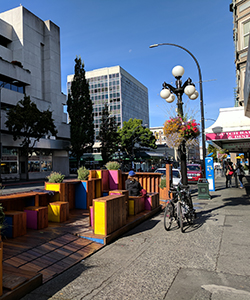
Communities of all sizes have a role to play in reducing greenhouse gas (GHG) emissions and adapting to climate change. Our built environments have impacts on our environment and on shared resources, like air, water, green space, and energy.
In 2007, the Province of BC, the Union of BC Municipalities, and local governments signed the BC Climate Action Charter, a pledge to work together to address climate change. To reduce emissions, local governments agreed to take action towards “creating complete, compact, more energy efficient rural and urban communities.”
Today – ten years later after the Charter was signed – the Real Estate Foundation has released Growing Smarter. The report summarizes the strengths of the Charter, reflects on progress made so far, looks to other examples of community climate action, and makes 10 recommendations for strengthening the Charter’s smart growth foundation.
We found that, despite efforts from many parties, little progress has been made in shifting travel to public transit, walking, and cycling. Because of this, GHG emissions associated with personal transportation (the largest GHG contributor in BC) remain near 2007 levels. If this trend continues, BC will not meet its 2020 commitment to reduce GHG emissions by 33% below 2007 levels.
 While the BC government has steadily increased spending on transit, these investments have been outpaced by spending on infrastructure that supports personal vehicle travel. The report finds that, for every $1 spent on transit between 2008 and 2011, $4.50 was spent on roads and bridges. For 2017 to 2020, road and bridge spending is projected to increase to $6.50 for every $1 allocated to transit.
While the BC government has steadily increased spending on transit, these investments have been outpaced by spending on infrastructure that supports personal vehicle travel. The report finds that, for every $1 spent on transit between 2008 and 2011, $4.50 was spent on roads and bridges. For 2017 to 2020, road and bridge spending is projected to increase to $6.50 for every $1 allocated to transit.
Stronger integration of land use and transportation planning will help the Province meet its climate action targets. To support this, the report makes 10 recommendations to provincial ministries.
Recommendations include:
- Bolster regional government authority and integrate transportation planning with land use in ways that support climate action.
- Strengthen the Agricultural Land Commission’s authority to protect farmland and limit non-agricultural use of protected land.
- Strengthen coordination amongst key agencies, ministries, and orders of government and support collaboration through the Climate Action Secretariat and the Local-Provincial Green Communities Committee.
- Use market-based tools to more fairly share the costs of transportation infrastructure and expand transportation choice.
- Update tax and fee structures to support sustainable financing of civic infrastructure.
- Help establish a Low Carbon Innovation Centre in the Lower Mainland.
- Create long-term transportation financing agreements between local, provincial, and federal governments.
- Update community GHG reduction target requirements and provide provincial support to help meet these requirements.
- Establish GHG impact assessment standards for local and provincial transportation projects and planning agendas.
- Reinvest in BC’s Community Energy and Emissions Inventory (CEEI) system to provide defensible transportation sector data.
The report was commissioned by the Real Estate Foundation of BC as part of its research on sustainable built environments in British Columbia. The report was prepared by Boston Consulting, in consultation with the Smart Growth Task Force, with contributions from MODUS Planning, Design and Engagement.
The paper was revised in December 2017.
—
Downloads:
SHARE